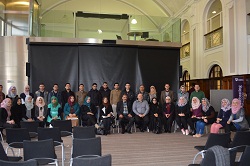Babylon students set to gain University of Northampton degree
Date 29.02.2016

Academics from the University of Babylon visited Northampton this week to talk about a franchise project which would allow Babylon students to study for a University of Northampton degree in their home country.
Students studying Network and Software at the University of Babylon’s IT College will prepare for a year by completing an English Language course and will then follow the same three-year syllabus as Northampton students; even sitting exams simultaneously. The first cohort is expected to start in September 2016. The moderation process will be handled by Babylon staff as first markers and by Northampton staff as second markers and external examiners will moderate both the university’s assessments.
Professor Dr Saad Talib Aljebori, Professor of Computer Sciences and Engineering at the University of Babylon, was joined by four of his colleagues: Professor Dr Israa Hadi, Assistant Professor Dr Ghaiola Bilab, Assistant Professor Dr Huda Naji and Assistant Professor Asmaa Shaker. During their time at the University of Northampton, they attended lectures, a group project session, and several final year dissertation talks as part of the staff development activities between the two universities. They also met some members of the Computing department to discuss future research project.
Dr Ali Al Shabaz, Senior Lecturer in Computing at the University of Northampton commented: “This course will cover both Software and Network as a continuation of the success we had in implementing the existing twinning programme. We believe there is strong evidence that the IT College staff are capable of delivering the franchise course, especially as they have received three face-to-face staff development workshops over the last three years and we have run the fourth one in Northampton in February 2016. Also, the quality of the existing Babylon students and their high achievements over the past two academic years shows the upcoming projects are likely to continue to be successful.”